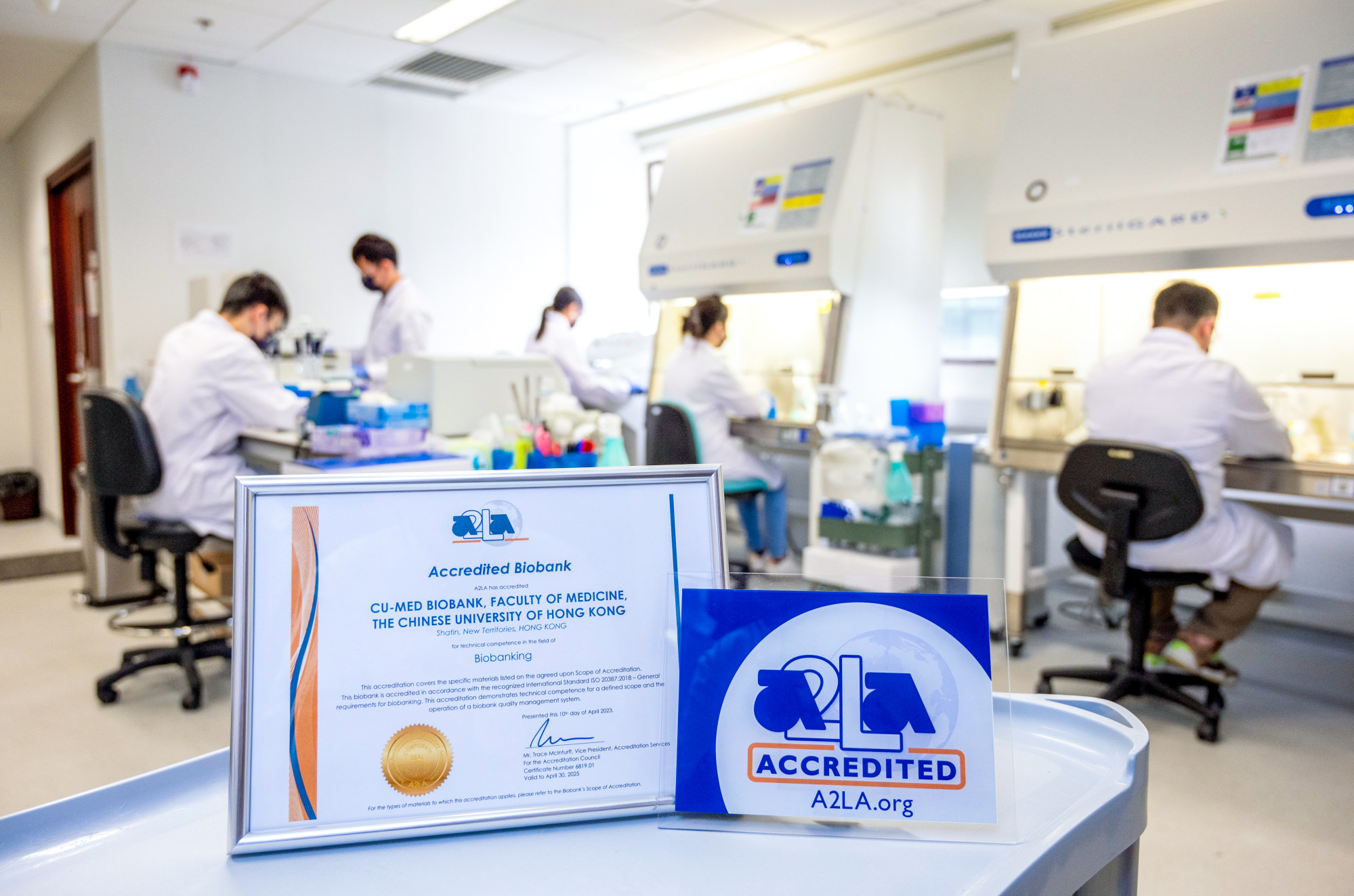
Boost for Hong Kong’s biomedical hub ambitions as Chinese University’s biobank gets international certification
- US body grants ISO certification to facility which stores more than 150,000 vials of human biospecimens
- Medical faculty dean Francis Chan says accreditation will help city play leading role in drug research
Chinese University’s biobank of data and human tissue samples has become the first in Hong Kong to obtain an international accreditation, with the institution saying it will boost the city’s status as a drug research and development hub.
The university said having an internationally accredited biobank meant that earlier stages of development and clinical trials could be done in the city, and it would be easier for research to be transformed into real-life applications.
The CU-Med Biobank, set up at the Prince of Wales Hospital in Sha Tin in 2019, received the ISO 20387:2018 accreditation in April. The certification was done by the American Association for Laboratory Accreditation, a non-profit and non-governmental body.
The facility, which has 21 freezers, currently stores more than 150,000 vials of specimens such as blood, urine and faeces. It can hold a million vials, and there are plans to increase its capacity.

Discussion of developing Hong Kong into a biomedical hub has been in the spotlight since health minister Lo Chung-mau said in an interview with the Post last month that the city was considering setting up its own drug regulatory mechanism, a move that could attract pharmaceutical firms to do research locally.
Professor Francis Chan Ka-leung, dean of Chinese University’s medical faculty, told a press conference last week that the accreditation meant Hong Kong could take a leading role in drug research.
“Hong Kong has the ability and potential to get international accreditation and attract overseas pharmaceutical firms to come to the city for research and trials, or even set up a base for drug development,” Chan said.
The accreditation process examined various aspects of the facility, from sample acquisition to processing, storage and distribution.
“A biobank is not just about having dozens of fridges,” Chan said. “We also need a stringent management system.”
Professor Ronald Ma Ching-wan, co-head of the biobank’s executive committee, said that data and information stored at the facility could help develop various areas in medicine, such as improving the diagnosis of genetic diseases, predicting risks of illnesses and developing precision medicine.
In a strategic document on developing genomic medicine in Hong Kong released by the government in 2020, facilitating the establishment of a biobank network was a key recommendation.
Hong Kong has various biobanks, including one on diabetes that has been collecting data from more than 20,000 patients since 2014.
Ma said researchers were able to use the data to make discoveries related to risk prediction, such as identifying a gene linked to the higher chance of diabetes among Chinese and East Asians.
They also identified a gene that could lead to a higher risk of end-stage kidney disease among Chinese diabetic patients.
He said more work was needed for researchers to translate basic research results into applications that directly benefited people.
Chan said biobanks with international accreditation were needed for drug development that began at the earliest stage, involving phase one trials and overseas funding.
“Without an internationally recognised base to handle biospecimens, no one would consider you,” he said, referring to major drug companies and potential investors.
He revealed that a number of international pharmaceutical firms had approached the university for collaboration since the accreditation was awarded, but did not provide more details.
Looking forward, the university hoped to share its experience in operating high-standard biobanks with other public hospitals, starting with the Hong Kong Children’s Hospital which treats patients with rare diseases.
The Hospital Authority said it had already invited representatives from the two local medical schools – at Chinese University and the University of Hong Kong (HKU) – to form a joint task force and begin discussions on the proposal to set up biobanks through their three-way collaboration.
Henry Yau Kwong-chi, managing director of HKU’s Clinical Trials Centre, said biobanks were useful for the development of genomic medicine but less so for clinical trials.
While acknowledging that accreditation showed that a facility met certain standards, Yau said he saw “no link” between clinical trials and the use of accredited biobanks.
“There has been no single incident in my over 20 years of experience where clinical trials were refused because of the lack of an accredited biobank,” he said.
He added that blood collected from patients in a clinical trial was usually either tested promptly or stored in a facility for a short time before being sent overseas for testing.
He felt having an accredited biobank could instead benefit genomic medicine which usually required long-term storage of biospecimens.
For example, if scientists in future identify a specific biomarker linked to cancer, they could retrieve blood specimens of cancer patients stored in the biobank for analysis to see if such an indicator existed.

